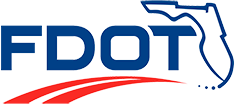Transportation Planning Studies
What Is Transportation Planning?
Transportation planning involves a series of activities undertaken to better understand our transportation system and decide what actions, if any, we need to take to improve it.
The purpose of transportation planning is to collaboratively and deliberately:
- Consider and address trends, needs, and opportunities,
- Guide decision-making,
- Formulate policy, and
- Feed project implementation.
Click on the “+” signs below to expand each section.
Strategic plans and visions establish a foundation for transportation decision making. Transportation planners consider statewide national, regional andlocal goals and desired outcomes when studying issues and developing transportation plans.

The Florida Transportation Plan (FTP) is the single overarching plan guiding Florida’s transportation future. It is a plan for all of Florida created by, and providing direction to, FDOT and all organizations that are involved in planning and managing Florida’s transportation system, including statewide, regional, and local partners.
Transportation plans and studies can have multiple starting and ending points. Many efforts led by FDOT build on previous plans and studies led by FDOT’s partners. Planning often begins by documenting existing conditions, making projections about the future, and formulating concepts and strategies to advance into more detailed evaluations.
Once concepts and strategies have been defined in enough detail to proceed, plans and studies can screen, evaluate, and compare solutions. Based on the results of this screening and evaluation, planners may then define next steps and timing for the development, design, and implementation of a preferred transportation alternative, a set of alternatives, or a bundle of related projects to be advanced by FDOT and its partners.
Plans and studies can generate a wealth of raw data, summarized information, public input, and recommended actions in many formats. FDOT values transparency and objectivity in decision making and ensures that the products of plans and studies are documented and publicly available. Effective information management also can improve handoffs to the next step in planning, or onward advancement to project development or design.
Plans and studies might explore general challenges and opportunities that affect transportation planning in the long term and/or over a broad area, they may focus on specific issues at a particular location, or anything in between.
Plans and studies can be multimodal, taking into account the many ways people and freight move around the state each day, and they can focus on a single type of transportation facility or network.
Plans and studies can be led by FDOT or by one of FDOT’s partners in planning at the state, regional, or local level.
There are several typical starting points for a plan or study. For example, if a transportation agency is faced with one of the challenges listed in the top row below, the agency might undertake one or more of the steps listed to the left.
| Potential Planning Challenges and Starting Points | |||
| Typical Components of a Plan or Study | We want to analyze data to determine what, if anything, is needed. | We know there is a need, but want to refine our understanding of it and investigate possible solutions. | We’ve defined the need and want to evaluate a range of alternate solutions. |
| Define Study Parameters and Determine Scope of Work | ✔ | ✔ | ✔ |
| Establish Consistency with Existing Plans and Visions | ✔ | ✔ | ✔ |
| Document Existing Conditions | ✔ | ✔ | |
| Project Future Conditions | ✔ | ✔ | |
| Identify Issues and Opportunities | ✔ | ✔ | |
| Formulate Potential Solutions | ✔ | ✔ | |
| Evaluate and Compare Potential Solutions | ✔ | ✔ | |
| Define, Package and Prioritize Alternatives for Advancement | ✔ | ✔ | |
| Document Decisions and Prepare Action Plan | ✔ | ✔ | ✔ |
The Florida Department of Transportation has the statutory responsibility to coordinate the planning and development of a safe, viable, and balanced state transportation system serving all regions of the state, and to assure the compatibility of all components, including multimodal facilities. FDOT’s Central Office Planning Team oversees a wide range of efforts and programs that lay the groundwork for transportation programming and project development. FDOT’s District Offices have their own planning functions that prepare projects for development, design, and implementation, in close coordination with regional and local partners and with input from the public.
Metropolitan Planning Organizations (MPOs), also named Transportation Planning Organizations (TPOs) and Transportation Planning Agencies (TPAs) in Florida, are federally mandated organizations comprised of representatives from local governments and transportation authorities. The MPO’s role is to develop and maintain the required transportation plans for a metropolitan area to ensure that Federal funds support local priorities. More information about MPOs is available on FDOT’s Metropolitan Planning Support page and from the Florida Metropolitan Planning Organization Advisory Council (MPOAC).
Local governments, including cities and counties, plan transportation infrastructure at the local level as part of the comprehensive planning process. Section 163.3177(6)(b), Florida Statutes, establishes the requirements for transportation and mobility planning in local government comprehensive plans. Comprehensive plans must focus on providing a multimodal transportation network that emphasizes public transportation systems, where feasible, and encourages economic development through flexible transportation and mobility options for Florida communities. The Florida Department of Economic Opportunity's website' resources regarding transportation planning at the local level and all county and city comprehensive plans and plan amendments can be found here.
Transportation infrastructure owners and operators other than FDOT and advocacy organizations also conduct transportation planning in Florida. FDOT’s Freight Logistics and Passenger Operations page has more information about Aviation and Spaceports, Freight and Multimodal Operations, Seaports and Waterwys, and Transit. The Florida Chamber of Commerce Foundation’s Six Pillars is an organizational framework that identifies key factors that drive Florida’s future economy and helps communities, agencies and organizations speak with one voice, of which Preparing Florida’s Infrastructure for Smart Growth and Development is included.

